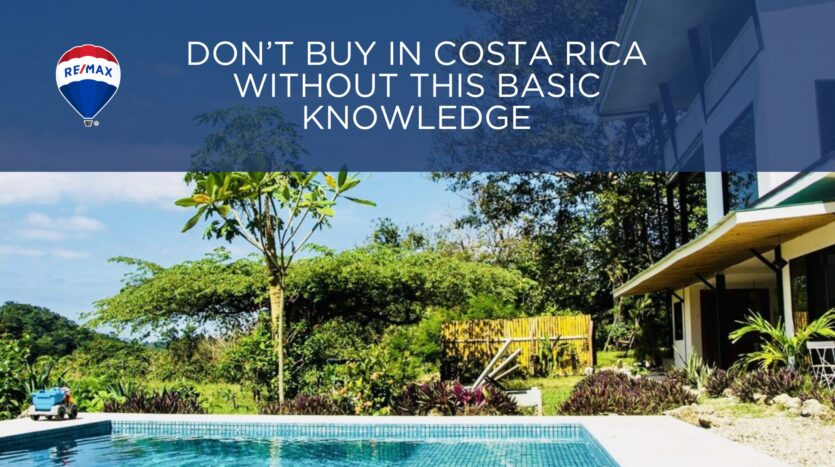Don’t Buy in Costa Rica Without this Basic Knowledge
Hi, my name is Shawn Fletcher. I’m with RE/MAX Oceanside here in Jaco Beach, Costa Rica, and the purpose of this video is to discuss ownership in Costa Rica as a foreigner. I want to walk you through a typical purchase and discuss important topics such as financing closing costs, title versus concession residency taxes, homeowners associations, and a few other important topics. If you are considering purchasing property in Costa Rica, this video is going to have a lot of helpful information for you. I’ve also put it into written form, so if you want to send me an email, I can forward you my buyer’s guide.
Property Ownership in Costa Rica as a Foreigner
Let’s discuss property ownership in Costa Rica as a foreigner. There are generally no restrictions for foreigners to own property in Costa Rica, and the Costa Rican Constitution actually affords foreigners the same rights as nationals when purchasing property. There’s one exception, which we’ll discuss later in the video, when it comes to concession properties, but otherwise, you, as a foreigner, can own fee simple, fully titled property just as you can in North America. When you purchase property, the buyer and seller need to appear before a notary public in order to sign the transfer deed in your name. A notary public in Costa Rica also must be an attorney, and this transfer deed is then submitted and reported to a central institution called the National Registry. The National Registry’s position is to guarantee the security of registered property rights. It’s a very secure system for owning property here in Costa Rica.
Concession Properties
Okay, so let’s talk about concession properties. Here along the coast, the first 50 meters from the mean high tide mark, no one can actually own or build in that area. The next 150 meters beyond that are called the maritime zone or the concession zone. In the concession zone, you can’t actually own the property; you’re leasing it from the government. On a 20-year term, you typically pay an annual concession fee, and at the end of the 20-year term, you have to apply to renew that concession. There’s another restriction for foreigners: they cannot own more than 49 percent of a concession property. So what foreigners typically do is form a Costa Rican corporation. They become 49 shareholders, and then they bring in a Costa Rican as a 51 shareholder, and then they have a private agreement signed between the two of them where that person has no rights over the property.
Now there is about 10 percent of the coastline in Costa Rica that is fully titled all the way up to the 50-meter mark, such as in Jaco. Here, the entire beach is fully titled up to the 50-meter mark, which is why we have a lot of condo towers and hotels built right up to the sand. Here, you can have a simple, fully titled property in the future.
The purchase process
Let’s talk about the purchase process now. It is incredibly important for you to work with a seasoned real estate agent because there is no MLS here in Costa Rica. Therefore, your real estate agent that you’re working with really needs to know the market well and be able to show you all properties within your goals, preferences, and budget. They need to understand the market.
Once you have identified a property that you want to purchase, this real estate agent is going to draft a purchase agreement for you. That’s going to look a lot like a purchase agreement in North America. It’s going to start with the property details. Then it’s going to have a deposit amount, which in Costa Rica a lot of times is 10 dollars. A third-party escrow company is in charge of holding that deposit. Just a word of warning: escrow companies are probably going to be the most difficult part of any transaction here in Costa Rica because Costa Rica has very stringent anti-money laundering regulations. So you’re going to have to prove your source of funds. I tell my clients, You’re going to feel like you’re a drug dealer or money launderer until proven otherwise. They’re going to ask for bank statements, tax returns, and other supporting income verification documents just to make sure that the money is clean.
Your money is going to be held fully refundable in this escrow company for a term of normally 15 to 20 days if we’re dealing with a standard condo or house. During those 15 to 20 days, you’re first going to have an attorney check the title to make sure that it’s clean and transferable and that there are no liens or encumbrances that are going to hinder the transfer of the title. We’re going to hire a home inspector who’s going to do an inspection on the house or condo. Then we’re going to negotiate repairs with the seller. Either the seller can agree to do the repairs before the closing or they can give you a credit. If you can’t come to some type of agreement on that, then you can walk away from the purchase and take your deposit back, no questions asked. We also do an inventory list during this period just to verify everything that’s included in the sale. Once we’ve concluded the due diligence period and everything is clean and understood, you can really close at any time after that. Even so, we’d like to put a little pad on it, normally for about 15 days, so 30-day clothes housing is very common in Costa Rica.
Who pays the closing cost?
The purchase agreement is also going to detail who pays the closing cost, and closing costs are significant, so it’s important to know that you have about four percent in total closing costs. That is comprised of legal fees, which amount to approximately 1.25%. You have a transfer tax of 1.5%; there are recording costs with the National Registry to record you as the new owner of the property that are about .87%; you’ve got a charge for the escrow company; and then there are some other little charges. If you want to, for example, own a Costa Rican corporation, there’s a fee to set it up.
Buying through a Costa Rican Corporation
When you purchase property in Costa Rica, you can either buy under your personal name with your foreign passport or you can set up a Costa Rican corporation, which is the equivalent of a North American LLC and one of the benefits of purchasing in a code. A corporation is one that does give you some liability protection here in Costa Rica. You cannot pierce the corporate veil, so any assets you have held in a corporation are protected that way. Let’s give a worst-case scenario: if you come on vacation and you rent a car and you accidentally run someone over on the side of the road, any of your assets that are within corporations would be fully protected from liability in that situation.
Another thing that incorporation is good for is that you can easily grant power of attorney for someone to sign on your behalf or to perform actions on your behalf without you having to be in the country. So a simple proxy can be emailed to you that you can sign and scan back, and you can give someone like me the power of attorney to, for example, change the name on your electric bill or even sell your property on your behalf without you being here. So you can detail that I grant Shawn the power to sign up on your behalf for x amount of purchase price on this date and that I can show up at the closing time, which I often do for my clients, and then I think they can close without having to fly here and be here in person. Owning in a corporation is also beneficial in that you can set up a bank account down here in the corporate name and have fewer restrictions than you would if you were going to set up a bank account in your personal name.
Now the negative of a corporation is, of course, going to be the cost. Currently, it costs about $650–700 to set up a corporation, and then you have annual maintenance. First of all, you have about $250 in corporate tax that’s payable every year. Then every April, with the help of an attorney, you have to pay them to register the shareholders. The government wants you to register who all the owners of the corporation are, and that’s going to run you another $250. So you have about $500 in annual expenses just to maintain the corporation.
Purchasing in Costa Rica in your personal name
If you purchase in your personal name, of course, you don’t have to pay any of these fees. The negative of purchasing in your personal name is that when you go to sell, if you are not a resident, the government is going to withhold 2.5% of the purchase price in lieu of you paying the capital gains. If you have a big gain from when you purchase to when you sell, this doesn’t matter because then you would be liable to pay the 15 in capital gains. You’re going to pay the higher of the two. If you were to sell for breakeven or a loss, you would still have to pay this 2.5 percent withholding tax. That’s the only case where owning your purchase in your personal name would be detrimental.
Bank Financing in Costa Rica as a Foreigner
Let’s talk about financing in Costa Rica as a foreigner. It is possible for a foreigner to get a loan with a Costa Rican bank, but to be honest, it’s very difficult. The customer service is going to be frustrating, but several banks are offering financing. One of them is Scotiabank. Another one is called Banco Mefise, and they’re currently offering interest rates of around eight and a quarter percent, which is normally only fixed for a year or two, and then it becomes an adjustable rate mortgage for the duration of the term. The banks here are offering between 25 and 30-year terms, and they’re normally going to have a prepayment penalty if you pay off the loan within the first 10 years. They’re going to use your income and assets in North America to qualify you. They’re going to run your credit score from up there. It’s important to note that with any financing here, you’re going to have added closing costs. You’re going to have roughly 1.85% of the loan amount in legal fees and recording costs to record the lien. There’s also going to be a small fee involved when you release the loan once you pay off the note in full.
Costa Rica Properties for Sale with Seller Financing
Since financing is pretty difficult with the local banks, we do a lot of seller financing. There are a lot of sellers who purchase property here; they bought it with cash, and it’s a second or third home, so in order to help them sell, they’ll offer financing to prospective buyers. It’s so prevalent that it’s one of the first questions we ask when we take a new listing from a seller. We ask if they’re willing to offer financing to prospective buyers in order to help sell their property. Our website even has a little check box that you can click on if you only want to look at properties that offer seller financing. Now the thing with sellers is that they obviously don’t want to be the bank for 30 years. Oftentimes, what they’ll do is amortize a loan over 30 years to lower the monthly payments, but then they’re going to have a balloon payment. This means that the whole balance is going to be due in three, five, or seven years. Sometimes I’ll see a seller go up to 10 years.
Sellers are typically going to want 30 to 50 percent down, and the interest rates are going to be totally negotiable. I’ve seen interest rates with sellers negotiated between 4 and 12%, although typically I see sellers trying to be somewhere close to what the local banks are charging. If the local banks are eight and a quarter right now, you can expect interest rates from sellers to try to be around seven and maybe nine percent. Since financing is difficult here in Costa Rica, one of the best ways to finance a property is if you have the luxury of having equity in a personal residence in North America, get a home equity line of credit or cash-out refinance, and then use those funds to purchase a property down here. That’s going to be your most affordable source of financing down here in Costa Rica.
Real estate trends
Let’s discuss real estate trends here in Costa Rica. There’s a common saying that “if the United States catches a cold, we sneeze,” and that’s been pretty true from what I’ve seen in my almost 20 years of doing business here. It typically happens on a delay, so if there’s some type of negative news or recession fears or whatever happening up in North America, typically we start feeling that down here six to eight months later. What I’ve seen is that our curves are not as steep as they are up north. I mainly attribute that to the lack of financing, which we just discussed.
Since it’s mostly a cash market, we have sellers who bought with cash; it’s their second or third home, so they’re not tied to a mortgage that they need to get free from. We don’t have as much of a buyer pool since it’s typically a cash market, so our listings don’t sell as quickly as they do in North America. That means our curves are not as steep as those in North America. We have steady, gradual appreciation, but you don’t see this type of thing going on all the time right now.
Buying into a Gated Community
Let’s discuss homeowners associations. If you’re buying into a gated community, you’re going to be subject to the rules and regulations of the condominium regime. Some important things to note are that, for one, a lot of them are not pet-friendly. If you do have a dog, cat, or multiple pets, make sure that you inform your realtor about this so that they can eliminate the associations that are not pet-friendly.
In the homeowners associations, you’re going to have monthly homeowner dues, and I’ve seen those range from $50 a month on up to over $1000 a month depending on the services that they include. What I see is that there’s typically a big difference between North American homeowner associations and Costa Rican homeowner associations. North American-run associations oftentimes include extra services to make it easier for the owner. For example, in this development that we’re in, they include water, cable TV, and high-speed wireless internet. There’s an on-site bilingual manager, and in a Costa Rican-run association, normally that’s going to be all the cart.
In a homeowners association, you’re going to own your condos; you own the title to the continent plus a percentage of the common areas. For example, there are 36 units here, so you’d own one of them, and then the owners would give you a quote that is typically based on the square footage that you own or the number of bedrooms. At least once a year, there’s going to be an annual meeting. Here, a majority vote can approve budget changes, personnel changes, and the like.
It’s really important if you’re buying into a homeowner association to read the bylaws and also to review their budget to make sure that they have an adequate reserve fund. This will assure you that you’re not going to get hit with a special assessment that’s going to come out of your pocket shortly after purchasing. It’s good to find out if there are any special projects that are on the books that you might have to come out of pocket for shortly after purchasing.
Costa Rica’s cost of living and monthly expenses
Okay, so once you own a property in Costa Rica, let’s talk about what type of monthly expenses you can expect. Utilities such as water are extremely affordable; you’re probably only going to have a $10–30 water bill on any property that you purchase. Electricity, on the other hand, can be quite expensive, and if you’re in a beach community where you’re going to have the air conditioner running quite a bit, you’ve got to be really cautious about what your electric bill might be. I would actually ask the realtor to provide you with a number of electric bills just so you know what you’re getting yourself into. There’s a big difference between mini-split and central air systems and whether or not they’re efficient. These new mini splits, which are kind of these wall units you have, can be very efficient if they’re the new inverted technology, but I typically see electric bills between 100 and up to over a thousand dollars a month in these speech communities.
You have cable and internet that usually come in a package for about $65 a month, which would give you pretty high-speed internet here on the beach. You can get at least 200 megabytes per second. Property taxes are a great topic because they’re very affordable; they’re 0.25% of the assessed value, and so, for example, on a $200,000 purchase, that would only be about $500 a year in property taxes. There is an exception if you fall into what they call the luxury tax category, and if that is if you have a construction value of over approximately two hundred and thirty thousand dollars, then after that, there’s a graduated scale, but normally it’s an additional 0.25 percent, and that’s only if you have a large residence with high-end materials that would fall into this luxury tax category.
Getting Residency as a Foreigner
Let’s discuss residency. If you are planning to move here full-time or retire here in Costa Rica, then it’s going to be advantageous for you to get your residency; otherwise, you’re going to have to leave the country every 90 days. When you arrive in Costa Rica, you get a stamp on your passport that allows you to stay for 90 days. With that said, the typical profile of the buyer that I work with is someone who’s going to use their property for just a couple months or more a year, and then they’re going to rent it out for the rest of the year. In that case, it may not be advisable to get your residency; once you’ve become a resident, you have to start paying into the car, which is the Social Health Care Program, which you may not end up ever using, so I would only say it’s worth getting residency if you’re going to be living here full time.
There are three main ways that our clients apply for residency. The first one is through investor residency, and Costa Rica says that you can invest in a business, a property, or a combination of items that are over $150,000. It used to be $200,000, but it was recently reduced to $150,000. So, for example, you can purchase a property for $130,000 and then a vehicle for $20,000, and that would qualify you for investor residency. The second option is through what’s called “pensionado,”or rent-retiree status. You’d have to show that you have a guaranteed pension of at least $1,000 a month; it could be Social Security. If you don’t have that, if you’re not yet retired, a third option is called rentista, and that is where you can show a guaranteed income of $2500 a month, or you could put $60,000 into a special bank account where you withdraw $2500 a month, and that’s your guaranteed income for 24 months. So those are your three main ways of qualifying for residency. The harder and more expensive routes would be to marry a Costa Rican or to have a child here in Costa Rica, but again, it’s not necessary to be a resident in order to purchase property here in Costa Rica.
Free Costa Rica Buyer’s Guide
I have all this information in written form, so if you want to shoot me an email, I can send you my buyer’s guide. I also know that each situation is different, so we can connect over the phone if you like, and we’d be glad to assist in your real estate search here in Paradise.
My name is Shawn Fletcher. I’m a realtor with RE/MAX Oceanside here in Jaco Beach, Costa Rica, and I am your oceanfront and condominium specialist.







